Key takeaways
- Eastern philosophy emphasizes harmony, mindfulness, and interconnectedness, inviting personal exploration over rigid answers.
- Core teachings include the importance of balance, impermanence, and interdependence, which foster compassion and awareness in daily life.
- Practical methods of engagement include reading original texts, practicing meditation, and participating in discussion groups to deepen understanding.
- Key lessons learned involve the power of presence, non-attachment leading to freedom, and the transformative nature of compassion in interactions.
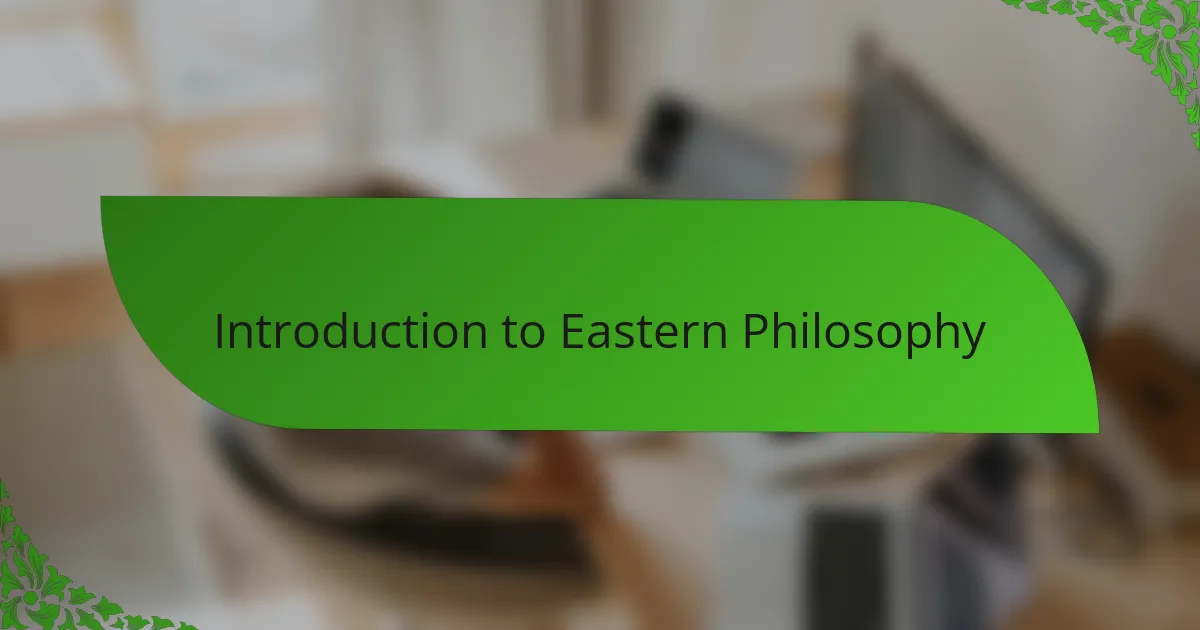
Introduction to Eastern Philosophy
Eastern philosophy, with its rich tapestry of ideas, often feels like a breath of fresh air compared to the fast-paced, result-driven mindset I was used to. Have you ever paused to wonder how ancient wisdom can still resonate so deeply with our modern struggles? For me, discovering concepts like mindfulness and interconnectedness felt like finding a missing piece I didn’t know was lost.
What strikes me most about Eastern philosophy is its emphasis on harmony—with oneself, others, and the universe. This wasn’t just abstract thinking; it invited me to practice patience and acceptance in a way my previous worldview never encouraged. Isn’t it fascinating how a simple shift in perspective can transform one’s experience of everyday life?
I’ve come to appreciate that Eastern philosophical traditions don’t chase after rigid answers but rather invite us to explore the questions themselves. This approach sparked a curiosity in me, turning philosophy from a distant subject into a personal journey. Have you ever felt that philosophy could be more than theory—something you live and breathe?
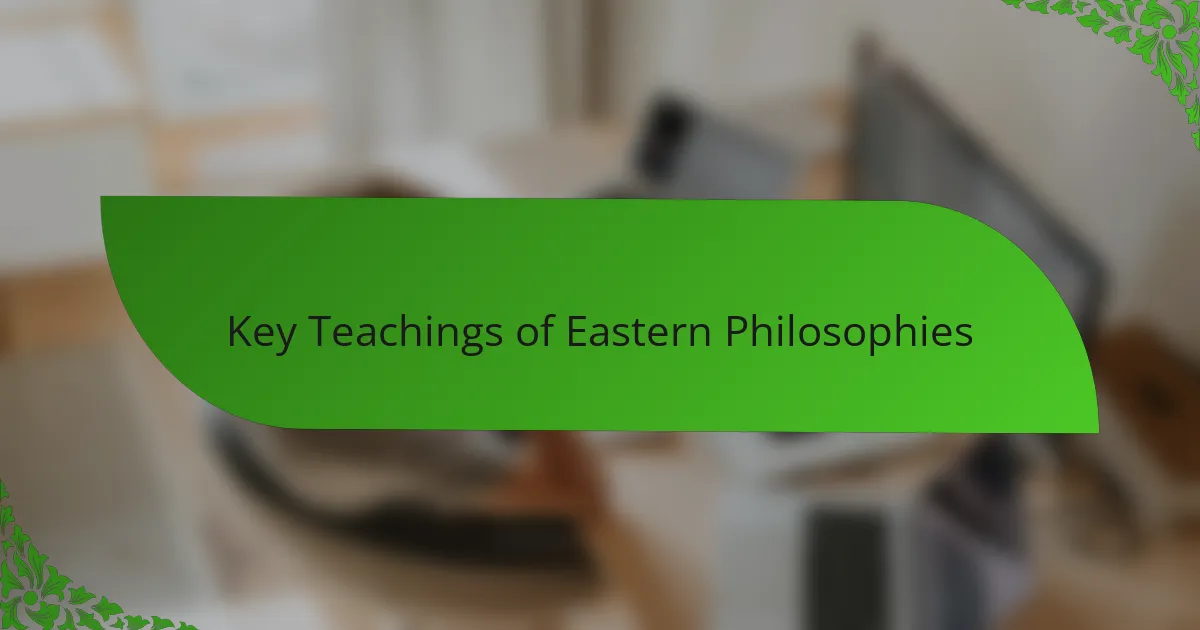
Key Teachings of Eastern Philosophies
What truly captivated me about key Eastern teachings is their focus on balance—whether it’s yin and yang or the middle path in Buddhism. Have you noticed how these ideas encourage us to avoid extremes and instead find a gentle equilibrium in life? That subtle way of living feels more compassionate and realistic than the all-or-nothing mindset I used to have.
Another core teaching that resonated deeply was the concept of impermanence. It’s like a quiet reminder that everything is constantly changing, and holding on too tightly only leads to suffering. I remember how this insight helped me cope during difficult times, giving me space to let go without feeling defeated.
Then there’s the idea of interdependence, which shifted the way I view my relationship with the world. Rather than feeling isolated, I started to see myself as part of a larger whole, intimately connected to people, nature, and the universe. Isn’t that a beautiful way to feel less alone and more responsible? This teaching made me rethink how I show up in everyday interactions, with more kindness and awareness.
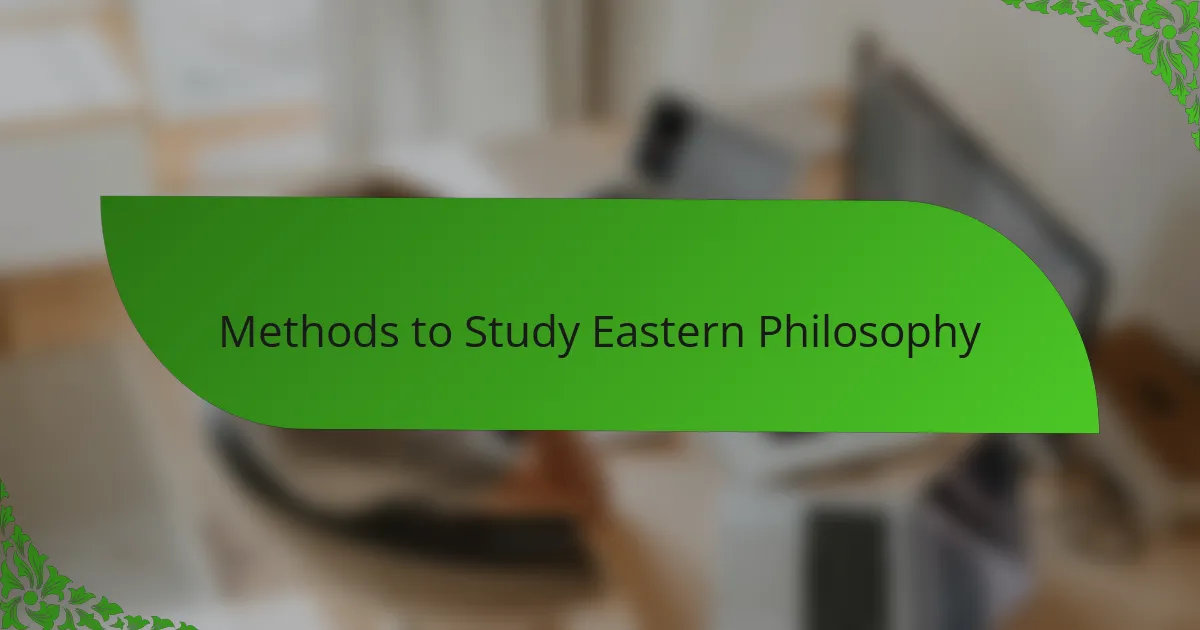
Methods to Study Eastern Philosophy
One method that truly helped me dive into Eastern philosophy was immersing myself in original texts, like the Tao Te Ching and the Dhammapada. Though daunting at first, reading these works slowly and reflectively allowed me to uncover layers of meaning, almost like a conversation with ancient minds. Have you ever tried reading something so old that it feels like a secret unfolding with each sentence?
Another approach that deepened my understanding was practicing meditation alongside study. By sitting quietly and observing my thoughts, I experienced the philosophies in action rather than just theory. This experiential learning bridged the gap between intellectual knowledge and living wisdom, making concepts like mindfulness come alive for me.
I also found immense value in joining discussion groups and workshops focused on Eastern thought. Engaging with others opened my eyes to different interpretations and practical applications I hadn’t considered. Don’t you think philosophy becomes more vibrant when it’s shared and explored together, rather than kept locked in solitary study?
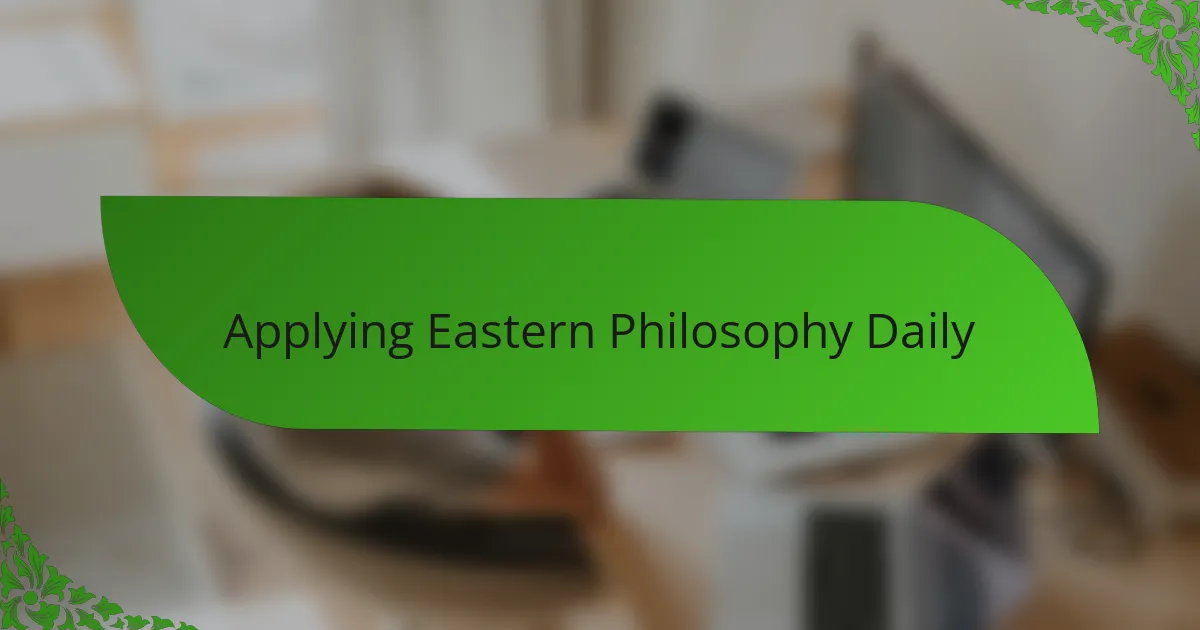
Applying Eastern Philosophy Daily
Incorporating Eastern philosophy into my daily life wasn’t instant—it began with small shifts, like pausing to truly breathe before reacting. Have you noticed how that brief moment of mindfulness can change the course of your day? For me, it turned moments of stress into opportunities for calm reflection.
One practice that became essential was embracing impermanence in everyday situations. When plans changed or challenges arose, instead of resisting, I reminded myself that change is natural and inevitable. This small mental habit eased my anxiety and helped me stay more present, even when life felt uncertain.
Applying these teachings hasn’t meant perfect adherence but rather gentle awareness—checking in with myself regularly and asking, “Am I living in harmony with my values right now?” That question, simple as it sounds, has opened doors to more thoughtful choices and compassionate interactions in my daily routines.
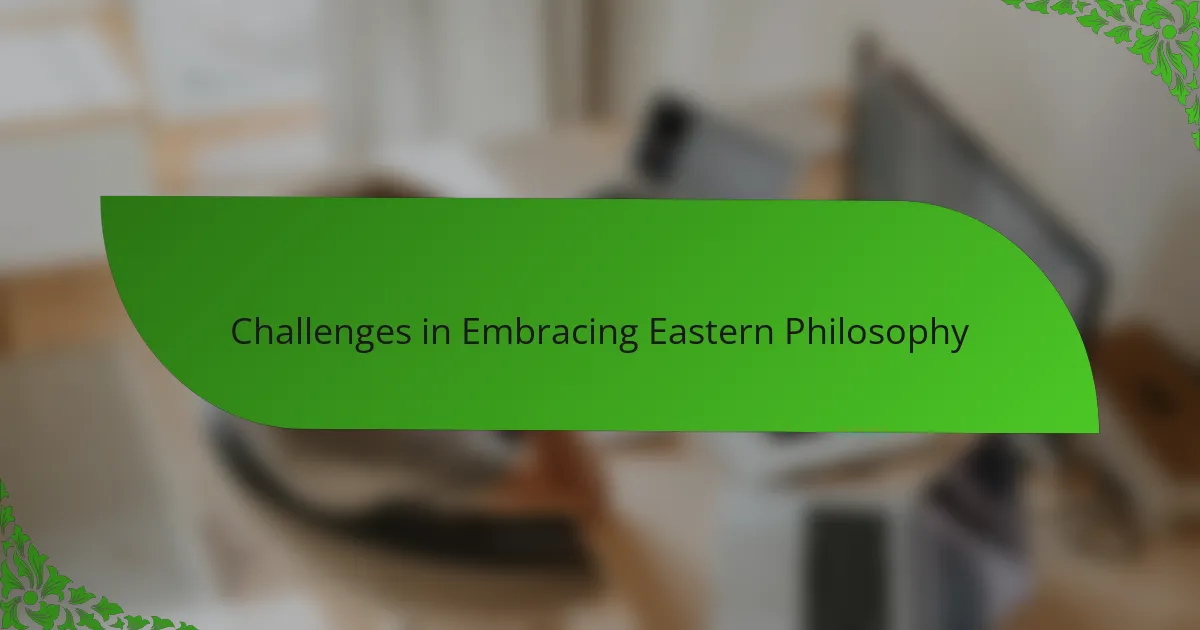
Challenges in Embracing Eastern Philosophy
Embracing Eastern philosophy wasn’t without its hurdles for me. At first, the language and symbolism felt foreign, almost like trying to unlock a code without the right key. Have you ever wrestled with ideas that seem spacious and abstract but hard to pin down in everyday terms? That tension made me question whether I was truly understanding or just skimming the surface.
Another challenge was unlearning deeply ingrained habits rooted in Western thinking—like seeking quick solutions and concrete definitions. It felt uncomfortable, as if I was stepping into a world where answers weren’t handed to me but had to be patiently discovered. I often wondered, how do you stay motivated when the goal is less about destination and more about ongoing inquiry?
Finally, there was the emotional resistance that came with facing concepts like surrender and non-attachment. Letting go of control didn’t come naturally; it felt like opening a door to vulnerability. Yet, this very discomfort became a teacher, nudging me toward a more authentic way of being. Don’t you think that sometimes our greatest growth lies exactly where we feel most uneasy?
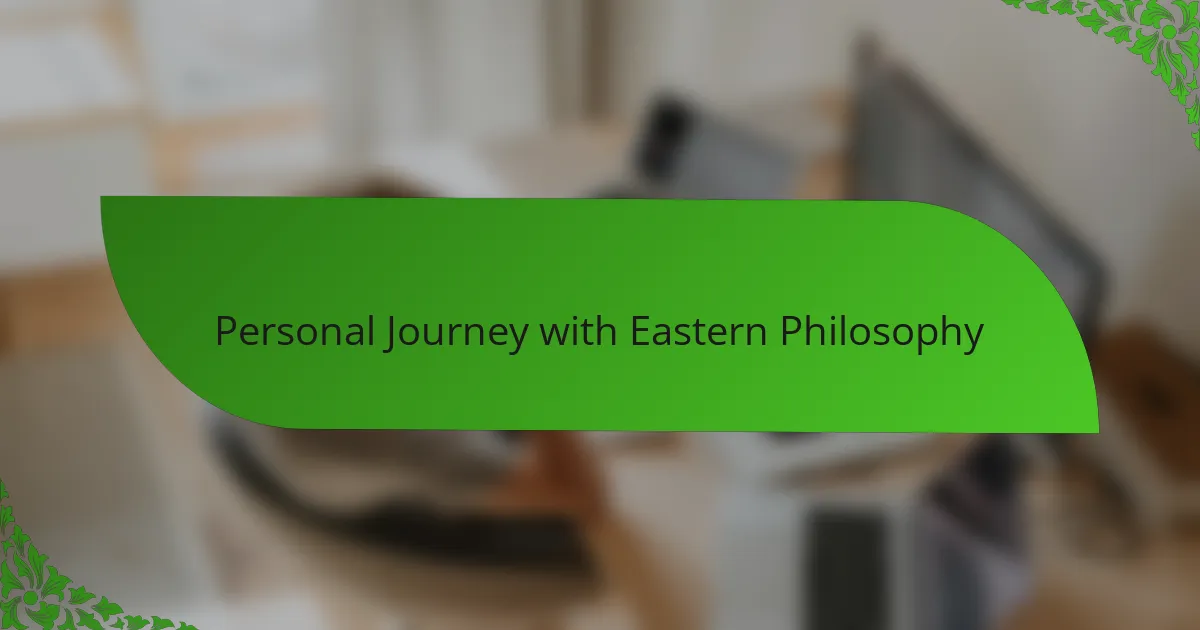
Personal Journey with Eastern Philosophy
When I first encountered Eastern philosophy, it felt like stepping into a vast, serene forest after years spent in a noisy city. I remember sitting quietly one afternoon, trying to grasp the idea of “wu wei,” or effortless action, and realizing it wasn’t about doing nothing but about flowing with life rather than against it. Have you ever experienced a moment when trying to control everything only made things harder? That’s when this teaching began to resonate deeply with me.
There was a time when I struggled to reconcile the patience Eastern thought demands with my usual impatient streak. Learning to embrace the present moment—without rushing toward outcomes—was challenging but transformative. I found myself slowly letting go of the constant need to fix or change, which felt both scary and liberating, like releasing a heavy backpack I hadn’t noticed I was carrying.
What surprised me most was how this journey wasn’t a straight path but a continual unfolding. Some days, I felt fully connected to these teachings; other days, doubts crept in, and old habits resurfaced. Isn’t that just like life itself—never perfect, always evolving? This ebb and flow have made me appreciate Eastern philosophy not as a neat set of rules but as a living conversation with myself and the world around me.
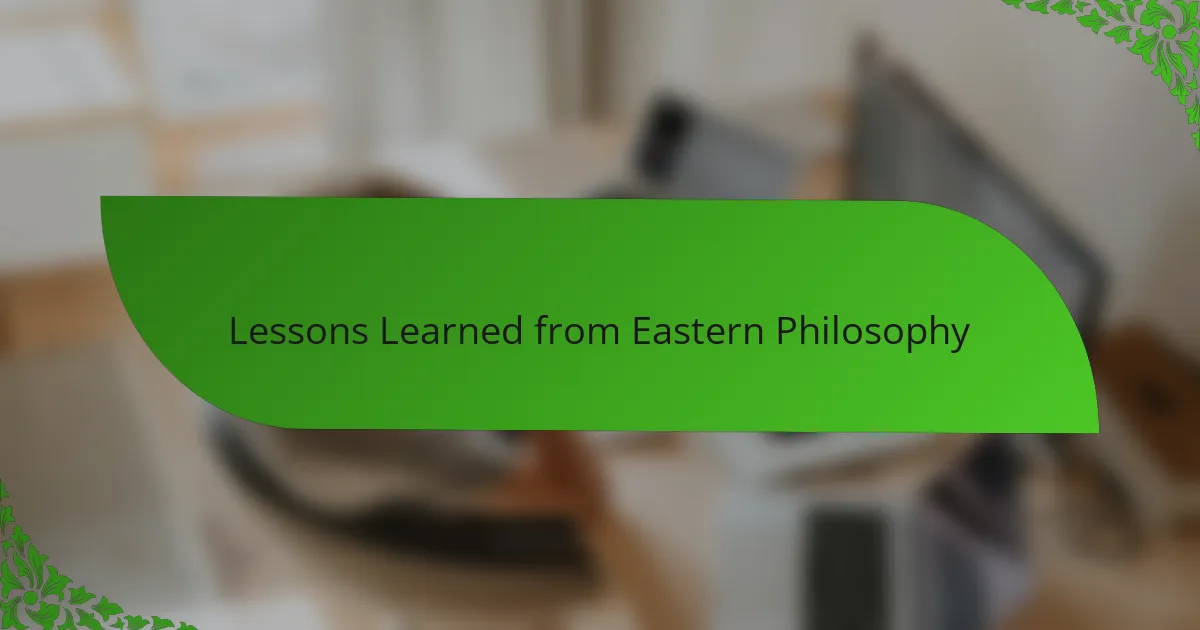
Lessons Learned from Eastern Philosophy
One lesson that truly stuck with me from Eastern philosophy is the power of presence. Instead of rushing through moments or fixating on past regrets and future worries, I learned to anchor myself in the here and now. Have you ever noticed how much more vivid life becomes when you actually pay attention to each breath or sound? That simple shift in focus brought an unexpected calmness to my daily routine.
The concept of non-attachment also challenged me deeply. At first, letting go of my need to control outcomes felt unsettling, like stepping into unknown territory without a map. Yet, over time, this openness allowed me to embrace change with less resistance and more grace. Isn’t it amazing how surrendering control can sometimes lead to the greatest freedom?
Lastly, the emphasis on compassion—towards myself and others—transformed many of my interactions. I realized I had been harsh with my own mistakes, expecting perfection in a way that only bred frustration. Eastern teachings reminded me that kindness is not a weakness but a path to genuine connection. Have you ever experienced how a gentle word or thought can soften the hardest moments? This awareness continues to reshape how I relate to the world every day.